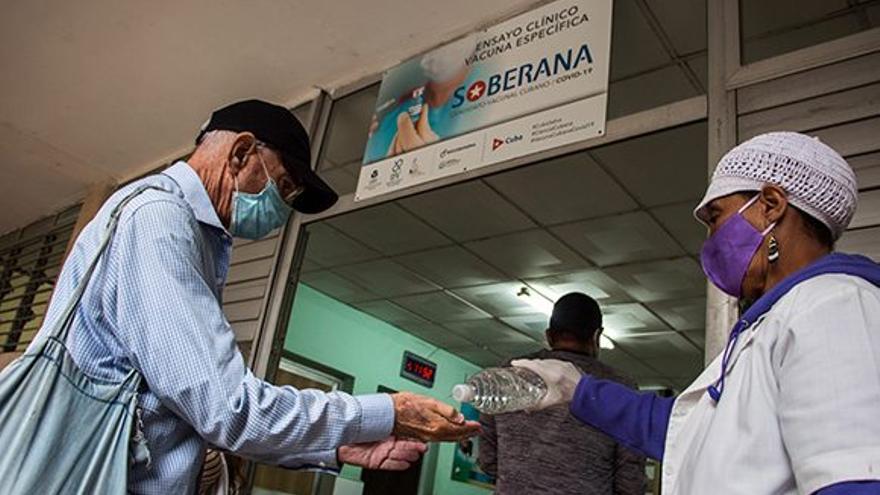
![]() 14ymedio, Havana, March 8, 2021 — Rollout of the Cuban vaccine will begin later than had been expected. At the end of December Vicente Verez, director of the Cuban Finlay Institute, predicted that vaccinations could begin in the first half of 2021 but scientific realities have forced him to temper his optimism. He now admits that the vaccinations will probably not begin until the summer.
14ymedio, Havana, March 8, 2021 — Rollout of the Cuban vaccine will begin later than had been expected. At the end of December Vicente Verez, director of the Cuban Finlay Institute, predicted that vaccinations could begin in the first half of 2021 but scientific realities have forced him to temper his optimism. He now admits that the vaccinations will probably not begin until the summer.
In an interview on Saturday on the Peruvian radio and television program “Exitosa”, Verez discussed the development of Soberana [Sovereign] 2. The vaccine has just begun Phase III trials, which are scheduled to last three months. The director of the Finlay Institute calculated that it will take another month to certify and produce the vaccine at a higher volume and that vaccinations would begin sometime around July. Asked if he believed it would be possible to be marketing it by August, he indicated he thought that was a realistic date.
Hopes of vaccinating the Cuban population in the first half of this year or, as had been previously predicted, to begin the process in March, have been dashed. The postponement also calls into question the government’s decision not to participate in the COVAX program, an international funding initiative designed to allow countries to acquire cheaper or donated vaccines. Although some wealthy countries have joined the effort, most are contributors to the fund and, as such, have agreed forego any of its benefits in order to allow cash-strapped nations to acquire vaccines at market-rate prices.
Cuba has not offered an official explanation as to why it decided not to participate in an initiative that would have already allowed it to begin immunizing its high-risk populations — the first COVAX vaccines began arriving at the end of February — as it continues to develop its own treatments.
The interview turned to the topic of exports when the moderator asked about possible shipments of Soberana 2 to Peru. Verez confirmed that the vaccine would would certainly be ready to ship by August. He declined to discuss the purchase price, which is covered by the terms and conditions of the contract negotiated by the parties to the agreement and based on different variables, though he assured the interviewer that it would be very competitive, much more so than vaccines currently on the market.
Clinical trials of Soberana 2 are now beginning simultaneously in Havana and Iran, where they are being conducted by the Pasteur Institute. Verez explained that 44,000 people in the Cuban capital have been chosen to participate, a very large sample size given to the relatively low prevalence of coronavirus on the island compared to the worst-hit countries. This trial’s participants will be divided into three groups. One of will receive only a placebo, the second group will get two doses of Sovereign 2 while the third will be given two doses of the vaccine as well as one dose of Sovereign Plus, a complementary medication announced last week as the fifth vaccine but that, according to Verez, is actually intended to act as a booster.
Though he declined to quantify the efficacy of the new vaccine candidate while Phase III trials are still ongoing, preliminary Phase II results are showing an immune response rate of 84% after two doses (administered twenty-eight days apart). After an additional dose of Soberana Plus, the rate could climb to as much as 95%, though he added, “We have to wait awhile before we know the final results.”
Verez explained that studies to create a new vaccine candidate in Cuba began nine months ago. It uses recombinant protein technology, which involves the reproduction of viral proteins found in the tips of the coronavirus and introduces them into the human immune system so that it learns to defend itself.
Among the questions left unanswered are how well it works in children, a population in which Soberana 02 will also be studied, and how well it responds to the variants strains emerging around the world.
Verez added that analysis of Soberana 1 results is also moving forward quickly though he did not provide any further information. This vaccine is currently in Phase II.
Cuba is also working on Abdala and Mambisa, two vaccine candidates being developed by Center for Genetic Engineering and Biotechnology (CIGB). The Abdala vaccine is awaiting authorization to begin Phase III trials while Mambisa, which is administered through the nose, is in Phase I.
Covid-19 remains uncontained and the infection rate is not trending downward, as might be expected after a slight tightening of restrictions which, now several weeks later, were obviously insufficient. On Sunday, 858 infections and four deaths were reported, for a total of 5,101 new cases at the end of the first week of March, according to the Ministry of Public Health.
____________
COLLABORATE WITH OUR WORK: The 14ymedio team is committed to practicing serious journalism that reflects Cuba’s reality in all its depth. Thank you for joining us on this long journey. We invite you to continue supporting us by becoming a member of 14ymedio now. Together we can continue transforming journalism in Cuba.
